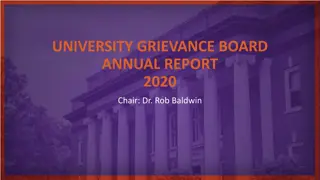
Legitimation in Systems of Authority
Explore the concept of legitimation in authority systems, including its principles, categories, and methods such as authorization, moral evaluation, rationalization, and mythopoesis. Discover how legitimation is crucial for maintaining belief in the legitimacy of authority structures.
Uploaded on | 0 Views
Download Presentation

Please find below an Image/Link to download the presentation.
The content on the website is provided AS IS for your information and personal use only. It may not be sold, licensed, or shared on other websites without obtaining consent from the author. If you encounter any issues during the download, it is possible that the publisher has removed the file from their server.
You are allowed to download the files provided on this website for personal or commercial use, subject to the condition that they are used lawfully. All files are the property of their respective owners.
The content on the website is provided AS IS for your information and personal use only. It may not be sold, licensed, or shared on other websites without obtaining consent from the author.
E N D
Presentation Transcript
Definition General principles of legitimation Major categories of legitimation Authorization Role model authority Moral evaluation Rationalization Mythopoesis
Every system of authority attempts to establish and to cultivate the belief in its legitimacy language is legitimation In his Ideology (1998), van Dijk examines legitimation as "a discourse analytical framework [that] is obviously a social (and political ) act and is typically accomplished by text or talk" (p.255).
(1) a complex ongoing discursive practice involving a set of interrelated discourses (2) accomplished in institutional contexts (3) a discourse that justifies 'official' actions in terms of the rights and duties, politically, socially or legally associated with that role or position (of its members) (4) presupposes norms and values (5) has a top-down direction
1-Authorization : by reference to the authority 2- Moral evaluation: by reference to values 3- Rationalization: by reference to the goals and uses of institutionalized social action 4- Mythopoesis: through narratives whose outcomes reward legitimate actions and punish nonlegitimate actions
1- Personal authority 2- Expert authority 3- Role Model authority 4- Impersonal authority 5- The authority of tradition 6- The authority of confirmity
legitimate authority is vested in people because of their status or role in a particular institution, e.g., parents and teacher in the case of children. Personal authority legitimation typically takes the form of a verbal process clause (Halliday, 1985: 129) in which the projected clause, the authority s utterance, contains some form of obligation modality: - - Joan sat down. Because the teacher said they had to. Joan sat down. Because the teacher said they had to.
legitimacy is provided by expertise rather than status, by mentioning credentials or just add their names, if known. expert legitimation takes the form of verbal process clauses or mental process clauses . Some experts say it is best to kiss the child, not look back and go. Dr. Juan believes it may be a good idea to spend some time with t Some experts say it is best to kiss the child, not look back and go. Dr. Juan believes it may be a good idea to spend some time with t
people follow the example of role models or opinion leaders. The role models may be members of a peer group or media celebrities imitated from afar, and the mere fact that these role models adopt a certain kind of behavior, or believe certain things, is enough to legitimize the actions of their followers. The wise teacher pronounce the child Experienced teachers involve the whole class in supporting the newcomer. The wise teacher fi fi nds pronounce the child s name. Experienced teachers involve the whole class in supporting the newcomer. nds out the correct way to s name. out the correct way to
the impersonal authority of laws, rules, and regulations. Impersonal authorities can be the subject of verbal process clauses just as readily as can personal authorities ( The rules state . . . ; The law says . . . ) the presence of nouns such as policy, regulation, rule, law, etc., or their cognate adjectives and adverbs (e.g., compulsory, mandatory, obligatory ) It is the policy in her area to admit children their fifth birthday. Playtime is usually a compulsory break in the program. It is the policy in her area to admit children termly their fifth birthday. Playtime is usually a compulsory break in the program. termly after after
key words like tradition, practice, custom, habit It was the practice for children in infant schools to be given free milk daily.
The implicit message is, everybody else is doing it, and so should you or most people are doing it, and so should you. Sometimes, conformity legitimation takes the form of an explicit comparison, high frequency modality, statistical tips Just Mummy had done, when they were children. Statistically same technique. Just as Uncle Jack and Uncle Ned, Auntie Mary and Mummy had done, when they were children. Statistically proved, same technique. as Uncle Jack and Uncle Ned, Auntie Mary and proved, many many schools now adopt the schools now adopt the
Moral evaluation legitimation is based on values, rather than imposed by some kind of authority without further justification. moral evaluation is linked to specific discourses of moral value. However, these discourses are not made explicit and debatable. by means of adjectives such as good , bad healthy, normal, natural, useful, and so on.
1- Evaluation 2- Abstraction 3- Analogies (positive or negative comparison)
Evaluative adjectives play a key role in moral evaluation legitimation. for instance, in the case of favored advertising adjectives such as green, crisp, cool, golden. Also natural , normal , Adjectives describing change of time It is only natural that the are It is only natural that the first are upsetting first days of school days of school upsetting. .
referring to practices (or to one or more of their component actions or reactions) in abstract ways that moralize them by distilling from them a quality that links them to discourses of moral values. Instead of the child goes to school for the first time independence, so that the practice of schooling is legitimized in terms of a discourse of independence. the child goes to school for the first time, we might say the child takes up
Comparisons in discourse almost always have a legitimating or delegitimating function. Sometimes, the comparison is explicit or implicit. An activity that belongs to one social practice is described by a term which, literally, refers to an activity belonging to another social practice the positive or negative values which, in the given sociocultural context, are attached to that other activity are then transferred to the original activity. Like an adult starting in a new job . . . the child will be worried. Like an adult starting in a new job . . . the child will be worried.
Two main types of rationality: 1- Instrumental rationality legitimizes practices by reference to their goals, uses, and effects. 2- Theoretical rationality legitimizes practices by reference to a natural order of things, but much more explicitly than the kinds of naturalization examined earlier.
Like legitimations, purposes are constructed in discourse in order to explain why social practices exist, and why they take the forms they do. purpose constructions must contain an element of moralization: whether the action is morally-justified (norm-conformative action) His mother joins the queue to pay his dinner money to the teacher. The reception teachers went to the nursery unit to see their His mother joins the queue to pay his dinner money to the teacher. The reception teachers went to the nursery unit to see their prospe prospe Expressions like it is useful, it is effective, and so on are themselves legitimating
General vs particular purpose legitimizing: The following strategies were employed to make the introduction to PE more smooth. The following strategies were employed to make the introduction to PE more smooth. Jane expression to establish positive bonds with her Jane s teacher used eye contact and facial expression to establish positive bonds with her. s teacher used eye contact and facial
Goal orientation purposes vs means orientation purposes
purposes are constructed as in people, as conscious or unconscious motives, aims, intentions, goals, etc. This requires (a) that the agency of the purposeful actor is explicitly expressed, and (b) that the purposeful action and the purpose have the same agent or, if the purpose is a state, that the person to whom that state is attributed is also the agent of the purposeful action. Your child may respond by spending hours happily entertaining herself drawing while she develops her visual, creative and motor skills. Your child may respond by spending hours happily entertaining herself drawing while she develops her visual, creative and motor skills.
In the case of means orientation, the purpose is constructed as in the action, and the action as a means to an end. Formal group time is a powerful mechanism for social control. A number of subcategories are described in Van Leeuwen (2000a): 1-the category of use, (used to, used for) 2-the potential of specific actions for serving specific purposes and uses ( allow, promote, help, teach, build, facilitate) 3- effect purposes ( to learn, to help, to control) Formal group time is a powerful mechanism for social control.
Legitimation is founded on some kind of truth, on the way things are. Theoretical rationalization is therefore closely related to the category of naturalization, but by explicit representations of the way things are.
1- definition 2- explanation 3- prediction
The activity is defined in terms of another, moralized activity. both activities must be objectivated and generalized, and the link between them must either be attributive ( is, constitutes, etc.) or significative ( means, signals, symbolizes, necessary ,etc.). Transition experience. School Transition is is a necessary stage in the young child experience. School signals a necessary stage in the young child s s signals that her children are growing up. that her children are growing up.
one or more of the actors involved in the practice. Explanations describe general attributes or habitual activities of the categories of actors in question. Parents use the same route to school each day because Small children thrive on routine. Parents use the same route to school each day because Small children thrive on routine.
they are meant to be based not on authority, but on expertise, and they can therefore be denied by contrary experience, at least in principle. Don t worry if you or your child cries. It won t last long.
Legitimation can also be achieved through storytelling. In moral tales, protagonists are rewarded for engaging in legitimate social practices or restoring the legitimate order. No wonder there had been so many voices cheering her on. The whole family had come with Daddy to see Mary Kate win her first race. No wonder there had been so many voices cheering her on. The whole family had come with Daddy to see Mary Kate win her first race. Cautionary tales, on the other hand, convey what will happen if you do not conform to the norms of social practices. Their protagonists engage in deviant activities that lead to unhappy endings.
Stories may also use symbolic actions, specific actions that can nevertheless represent more than one domain of institutionalized social practice and so provide a mythical model of social action Instances of delegitimization can be seen in a mythical action
THANK YOU THANK YOU








